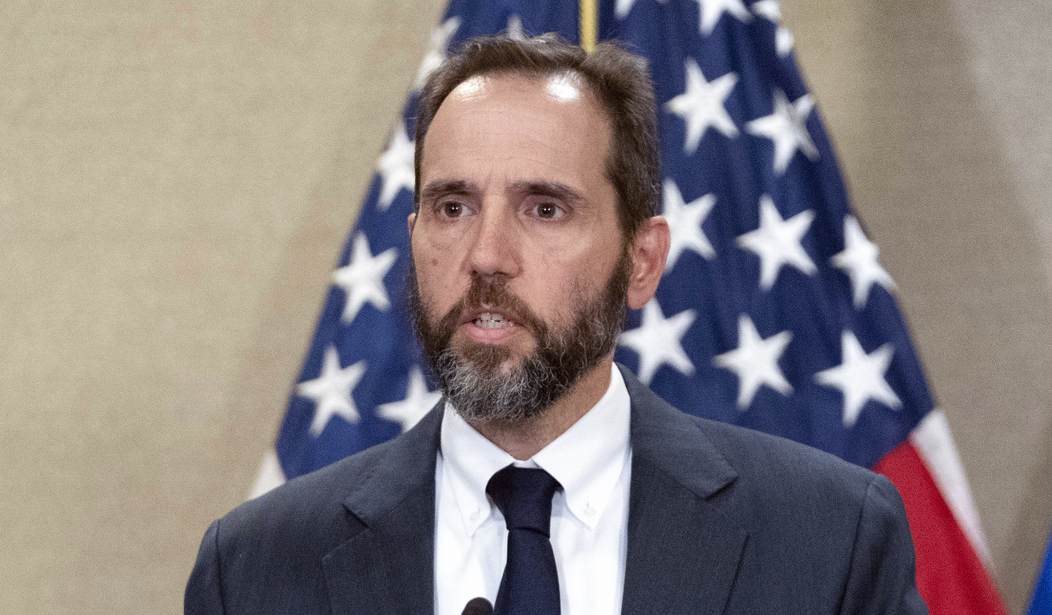Jack Smith Drops Filing That Vows to Prove that Trump Urged Violence, but There Are Some Problems With It
Special counsel Jack Smith on Tuesday made a court filing against former President Donald Trump outlining his intention to prove a series of allegations against him. The filing presents a narrative of Trump supposedly inciting violence, among other accusations, and delves into Trump’s conduct after the 2020 presidential election. Smith details some of the evidence he will be introducing to prosecute the former president, and if this filing is any indication, the case for proving he encouraged violence appears to be pretty thin.
The document delves into various aspects of the former president’s conduct and highlights specific actions that Smith’s team seems to believe were inciting. Of particular interest to Smith’s team is Trump’s supposed pattern of using public statements and social media to prompt violent action.
The defendant has an established pattern of using public statements and social media posts to subject his perceived adversaries to threats and harassment... including the defendant’s public endorsement and encouragement of violence.
The idea is that Trump’s behavior isn’t just heated rhetoric, Smith’s team seems to believe they can prove that it translated into real-world threats and harassment.
As an example, the document attempts to tie Trump to alleged extremist groups, using the presidential debate in September 2020. When the former president was asked to denounce the Proud Boys, a group that has been accused of engaging in political violence, Trump’s response was to tell them to “stand back and stand by.” The state is attempting to portray this statement as an expression of support and an order to hold off on violence until a later time.
"Members of the group embraced the defendant’s words as an endorsement and printed merchandise with them as a rallying cry," the filing claims.
The prosecution also accuses Trump of continuing to target individuals even after knowing his claims that the 2020 election was stolen could lead to violent outcomes. It cites the case of two Georgia election workers who were subjected to “vile racist and violent threats and harassment,” due to Trump’s accusations of election fraud.
Even further, Smiths’ team is set to present evidence showing that Trump’s support for those arrested for J6 shows that he supported the violence at the Capitol building. The document cites his public comments about the J6ers after the riot as evidence that he supported their actions.
"Evidence of the defendant’s post-conspiracy embrace of particularly violent and notorious rioters is admissible to establish the defendant’s motive and intent on January 6," according to the filing.
Smith’s filing attempts to portray Trump as a sort of mastermind who orchestrated the J6 riot while also using mafioso tactics to prevent people from contradicting his claims about the election.
The Government will introduce such evidence to further establish the defendant and his co-conspirators’ plan of silencing and intent to silence those who spoke out against the defendant’s false election fraud claims"; the defendant’s knowledge that his public attacks on officials—like those on his Vice President as described in the indictment—could foreseeably lead to threats, harassment, and violence; and the defendant’s repeated choice to attack individuals with full knowledge of this effect.
In addition to the allegations that Trump incited violence, Smith’s filing highlights a series of other allegations, particularly related to the former president’s pattern of claiming election fraud. "As set forth in the indictment the defendant’s criminal conspiracies relied on his knowingly false claims of election fraud," the document states, noting that Trump's allegations about voter fraud date back to as early as 2012 and later became a constant theme in the 2016 campaign.
This is mentioned to make it appear as if Trump had engineered a long-term plan to claim voter fraud if an election did not go his way, rather than a spontaneous reaction to the outcome of the 2020 race.
In the end, Smith’s filing claims he will prove that Trump was a sort of evil genius who masterminded an entire plot to dispute the outcome if he lost an election, even going so far as to concoct a violent attack against the government.
Let’s be blunt, shall we? If this is the best that Smith’s team has, this case might not go well for them. This “evidence” is rather shaky, at best and I haven’t seen anything that would suggest that Trump inspired a bunch of people to riot at the U.S. Capitol. Sure, Trump uses strong language, but he is not the first or last politician to do so.
Moreover, the notion that a politician should be responsible for people taking it upon themselves to engage in violence could lead to a terribly dangerous place. Should the state prosecute Sen. Bernie Sanders (I-VT) because the man who tried to assassinate Republican politicians was allegedly inspired by his rhetoric?
Of course not.
Basically, this indictment boils down to arguing that because Trump disputed the election results and said some mean things about people, the state should prosecute him. If the court handles this fairly, it seems doubtful to me that the prosecution will be able to make these particular allegations stick.





Post a Comment